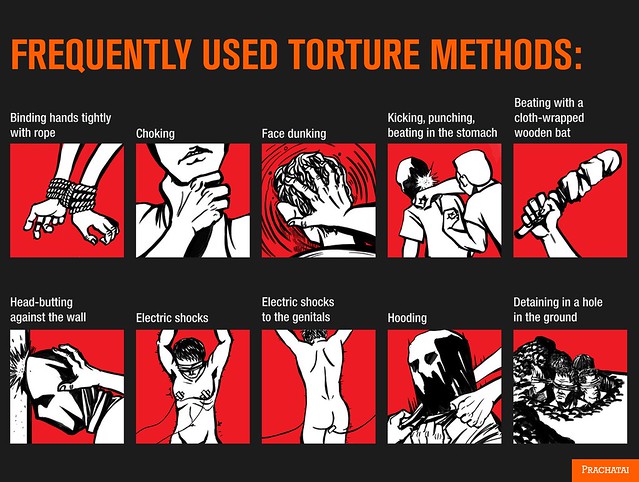After years of campaigning and lobbying by human rights groups, the junta-appointed lawmakers have dropped a bill to criminalise torture and enforced disappearance.
On 28 February 2017, Pornpen Khongkachonkiet, a human rights lawyer and Director of the Cross Cultural Foundation (CrCF) of Thailand, posted on her Facebook account that the junta-appointed National Legislative Assembly (NLA) has suspended indefinitely consideration of a bill to criminalise torture and enforced disappearance.
The now suspended bill was the first law to recognise and criminalise torture and enforced disappearance by the Thai authorities even in cases where the body of the victim is missing.
The Justice Ministry submitted the bill to the NLA in 2016, a decade after Thailand signed the UN conventions against torture and enforced disappearance
Under the bill, any government official or employee of the state who committed torture would have had to serve a jail term of from five to 20 years. If the torture led to serious injury, this would increase to 10-30 years and if a person was tortured to death, the official would face life imprisonment and a fine of from 600,000 to one million baht.
It also stated that officials who committed enforced disappearance would face five to 20 years in jail. If the enforced disappearance led to serious injury, this would increase to 7-30 years, and officials would face life imprisonment if the act led to the death of the victim.
Due to the lack of any law which criminalises torture and enforced disappearance, Thai state officials who have committed these offences in the past have never been punished for them.
During the Thaksin Shinawatra administration, at least 2,500 drug suspects were killed extrajudicially and many more alleged that they were tortured by paramilitary troops or police officers. Although it has been more than a decade since the war on drugs was scrapped, not a single police officer has been prosecuted or arrested.
In 2011, Suderueman Maleh was sentenced to two years in jail for claiming that he had been tortured by police. The lawyer representing Suderueman in this torture case was abducted and disappeared in 2004. Yes, that lawyer was the prominent Muslim lawyer Somchai Neelapaijit.
According to an Amnesty International statement in 2016, the Thai junta has allowed a “culture of torture” to flourish since the 2014 coup d’état, as many political dissidents detained by the authorities claimed that they suffered from beatings, smothering with plastic bags, waterboarding and being electrocuted.

Officials often use the following torture methods to extract confessions: binding hands tightly with rope, choking, face dunking, kicking, punching, beating in the stomach, beating with a cloth-wrapped wooden bat, head-butting against the wall, and electric shocks. Some methods do not leave a mark: hooding, exposure to extremely high or low temperatures or light to darkness for extended periods of time, death threats, threats to harm detainees' family members, forced feeding or injecting drugs which lead to loss of consciousness.
Prachatai English is an independent, non-profit news outlet committed to covering underreported issues in Thailand, especially about democratization and human rights, despite pressure from the authorities. Your support will ensure that we stay a professional media source and be able to meet the challenges and deliver in-depth reporting.
• Simple steps to support Prachatai English
1. Bank transfer to account “โครงการหนังสือพิมพ์อินเทอร์เน็ต ประชาไท” or “Prachatai Online Newspaper” 091-0-21689-4, Krungthai Bank
2. Or, Transfer money via Paypal, to e-mail address: [email protected], please leave a comment on the transaction as “For Prachatai English”
